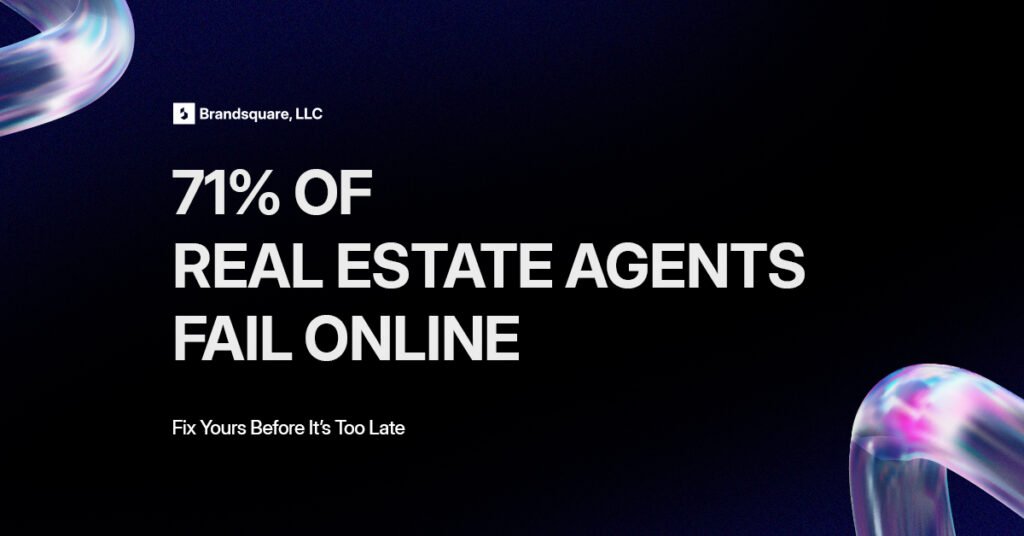In 2024, 71% of real estate agents didn’t close a single deal.
That’s not an exaggeration. That’s data reported by Inman and confirmed by Redfin’s brokerage research. Out of every 10 licensed agents you know, 7 didn’t sell a single property all year.
On paper, they have the credentials. In reality, they’re invisible online.
And here’s the truth:
- It’s not because they’re lazy.
- It’s not because the market is “bad.”
- It’s not even because buyers disappeared.
It’s because their branding and online presence failed them.
When 97% of homebuyers start their search online (NAR), a weak website, vague copy and zero trust signals will kill your pipeline before you even get a chance to pitch.
The good news is that when 71% of agents are failing, you don’t need to be perfect to win. You just need to be clear, credible and consistent.
This guide will break down exactly why agents fail online, the biggest real estate website mistakes and how real estate branding can position you in the top 30% who actually close deals.
The Harsh Reality of Failing Online
Think about the last time you searched for a local service. Maybe a dentist, a financial advisor or even a restaurant.
What happened when the website looked outdated, generic or confusing?
You left.
Real estate works the same way.
Consumers don’t give you three chances. They give you three seconds.
If your website doesn’t immediately answer:
- Who you are
- What you do
- Why they should trust you
you’ve already lost them.
With nearly half of agents closing zero or one deal per year (Consumer Federation of America), the numbers prove it. Most agents aren’t failing in person, they’re failing online.
The 5 Big Reasons Real Estate Agents Fail Online
1. Cookie Cutter Websites
Most agents rely on brokerage templates or drag and drop builders. The result is digital clones. Everyone has the same homepage, the same “search listings” button, the same stock photos. When you look like everyone else, you compete on nothing but price.
2. Vague Messaging
“Your Local Real Estate Expert.”
“Helping You Reach Your Potential.”
These taglines are everywhere and they mean nothing. They don’t say who you serve, what you specialize in or what results you deliver. Vague messaging is the fastest way to lose trust online.
3. No Positioning or Niche
In markets like Miami or San Francisco, there are thousands of agents. If your pitch is “I sell homes,” you’ve already lost. The agents who stand out position themselves clearly: “luxury condos for investors, family homes for tech professionals, vacation properties for out of state buyers.”
4. Poor UX (User Experience)
Bad UX silently kills leads.
- Slow loading sites
- Broken mobile layouts
- Confusing navigation
- Buttons that say “Learn More” instead of “Book Your Visit”
Buyers don’t complain about poor UX. They just leave.
5. Lack of Trust Signals
The number one real estate website mistake is no proof. Testimonials like “great agent” don’t convince anyone. Buyers want numbers, before and after stories and results. Without trust signals, your site is just another pretty brochure.
71% vs 30%: What Top Agents Do Differently
Here’s the difference between agents who fail online and those who dominate their market:
| Agents Who Fail (71%) | Agents Who Win (30%) |
|---|---|
| Generic template websites | Custom branded websites |
| Vague slogans | Clear, outcome-driven messaging |
| No niche, “serve everyone” | Focused positioning and niche clarity |
| Reactive to market shifts | Proactive, adaptive learning |
| Weak or no follow-up | Relentless, value driven follow up |
| Blend in with competition | Differentiate with trust and proof |
Success online is not about luck. It is about execution.
Branding: The Differentiator Between the 71% and the 30%
Branding is not just logos and colors. For real estate professionals, branding is about positioning, clarity and trust.
Here’s how branding fixes the core problems:
Positioning That Stands Out
Forget “I sell homes.” Try:
“I help luxury condo buyers in Miami find high value waterfront properties without wasting time on listings that don’t fit.”
Copy That Converts
Your copy should sound like you are speaking directly to your client’s problem. Example:
Instead of “I care about my clients,” say:
“90% of my listings sell in under 60 days at or above asking.”
UX That Builds Confidence
A site that is fast, mobile first, and CTA driven creates trust before a client even calls you.
Visual Identity That Signals Market
Luxury agents need timeless typography, editorial photography and a refined palette. Family focused agents need warm tones, approachable fonts and lifestyle images.
Trust Signals That Close Deals
The best agents don’t just say “trust me”, they show it:
- Client testimonials with names, photos and measurable results
- Case studies with before-and-after stories
- Screenshots of client wins
- Video testimonials
The 5C Framework for Real Estate Branding Success
At Brandsquare, we use the 5C Framework to transform real estate websites into high performing digital assets. These five pillars separate agents who fail online from those who consistently close.
1. Clarity
Clarity means knowing exactly who you serve and why.
- What clarity looks like: A homepage that instantly communicates your niche and your promise. Example: “Helping Miami luxury condo buyers secure high value waterfront properties without wasted time.”
- Why it matters: Buyers and sellers don’t want a generalist. They want someone who understands their exact context. Clarity filters out the wrong clients and attracts the right ones.
- Action step: Write your positioning in one sentence: “I help [specific audience] achieve [specific outcome] in [specific market].” Put it front and center on your site.
2. Copy
Your words are your brand’s voice. Copy is what makes your expertise feel human, relatable and valuable.
- What strong copy looks like: Outcome driven statements, clear CTAs and skimmable structure. Example: “90% of our listings sell in under 60 days at or above asking.”
- Why it matters: People don’t read websites. They scan them. Strategic copy guides their eyes from headline to proof to action.
- Action step: Use the formula (Problem → Insight → Outcome → Action) across your site. Show that you understand the client’s challenge, share perspective, prove results and invite them to act.
3. Credibility
Credibility is the bridge between attention and trust. Without it, you are just another agent making promises.
- What credibility looks like: Testimonials with names and numbers, before and after case studies, client logos, screenshots of wins and even video proof.
- Why it matters: In real estate, clients are making 06 or 07 figure decisions. They won’t risk it on someone without evidence of results.
- Action step: Replace vague testimonials like “great agent” with specific ones: “Robert sold my condo in 27 days for 15% above asking. He handled everything with zero stress.”
4. Consistency
Consistency builds recognition and authority. If your brand looks different on every platform, it creates friction and doubt.
- What consistency looks like: Same colors, fonts, messaging and tone across your website, social media and offline materials.
- Why it matters: Trust is built when every touchpoint feels aligned. Inconsistency confuses clients and dilutes credibility.
- Action step: Audit your online presence. Does your Instagram match your website? Does your LinkedIn headline align with your homepage message? If not, align them.
5. Conversion
Conversion is the final piece. If your site looks good but doesn’t drive action, it’s just a brochure.
- What conversion looks like: Clear CTAs (“Book a Call,” “Schedule a Showing”), mobile first design, short contact forms and a logical flow that makes the next step obvious.
- Why it matters: Clients need guidance. A strong site reduces friction and tells them exactly what to do next. Without conversion, even great branding leaks leads.
- Action step: Add one strong, visible CTA on every page of your site. On mobile, consider a sticky “Book a Call” button.
Case Study: From Invisible to High Trust
A Bay Area agent came to us with a generic brokerage site. Their headline was: “Helping You Find Your Dream Home.”
We repositioned them as: “Helping Tech Professionals Upsize Into Luxury Family Homes in Palo Alto.”
We rebuilt their website with sleek UX, added testimonial videos and rewrote copy with measurable results.
Outcome:
- Inbound leads doubled in 30 days.
- Time on site increased by 2x.
- They closed 3 high ticket deals within 90 days, directly attributed to their website.
That is the power of branding done right.
Tactical Checklist: Are You in the 71%?
Ask yourself:
- Is your headline generic?
- Do you lack a clear CTA?
- Is your mobile site broken or confusing?
- Do your testimonials lack results?
- Does your “About” page talk more about you than your clients?
- Does your site look like everyone else’s in your city?
If you answered yes to two or more, your wesite is holding you back.
How to Succeed Online as a Real Estate Agent in 2025
The difference between agents who fail and agents who thrive is rarely talent. It is discipline, positioning and execution online. If you want to break out of the 71% who closed no deals last year and join the 30% who did, here are 05 detailed strategies to make your online presence work like your best salesperson.
1. Define Your Niche
Most agents describe themselves as “helping buyers and sellers.” That is not positioning.
- Buyers and sellers want the right agent who understands their situation.
- Online, it looks like this: instead of “Your Trusted Local Agent,” write “Helping San Francisco Tech Professionals Upsize Into Luxury Family Homes Without the Stress.”
- Quick win: Audit your last 10 deals. Find the common thread. That is your niche.
2. Rewrite Your Copy
Great copy is the fastest way to stand out.
- Buyers skim. Your words must grab trust quickly.
- Common mistake: vague slogans like “Your Local Expert.”
- What works: lead with outcomes. “90% of my listings sell in under 30 days at or above asking.”
- Quick win: Use the (Problem → Insight → Outcome → Action) formula.
3. Upgrade Your UX
A beautiful site is useless if it confuses.
- 88% of users will not return after a bad experience.
- Good UX means mobile-first design, fast load times, clear CTAs and logical flow.
- Quick win: Test your site on your phone. If it takes longer than 5 seconds to load, you are losing deals.
4. Stack Proof
Trust is not claimed, it is shown.
- Proof means testimonials with results, case studies, screenshots of wins and media mentions.
- Common mistake: using testimonials that only say “great to work with.”
- Quick win: Add a “Results” section on your homepage with 3–5 outcome driven testimonials.
5. Stay Active
A static site is a dead site.
- Momentum signals authority. If your site looks abandoned, so does your business.
- Stay active by adding case studies quarterly, publishing insights monthly and refreshing homepage copy twice a year.
- Quick win: Add one fresh testimonial or case study this week.
Final Thought: Opportunity in the 71%
The 71% stat is not just a problem. It is your opportunity.
When most agents fail online, it does not take much to stand out.
A clear brand, a strategic website and consistent proof are enough to move you from invisible to in demand.
Your website should not just look good. It should perform like your best SDR.
Ready to See Where You Stand?
Most agents build trust offline, then send clients to a website that kills it in seconds. Don’t be one of them.
At Brandsquare, we’ve helped over 1,573+ top performing professionals, including real estate agents, coaches, financial advisors and healthcare experts transform generic websites into high trust digital assets that attract leads and close deals.
Our sites are built on strategy, proof and modern UX. That’s why our clients consistently land in the top 1% of their industries.
If you’re serious about stepping out of the 71% and into the elite 30% who close, it starts with your online presence.
Get a free website audit today and let us show you where your site is leaking trust and how to fix it.
Your brand deserves more than “just another agent.” It deserves to position you as the go to real estate agent in your market.




